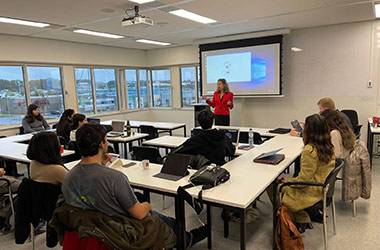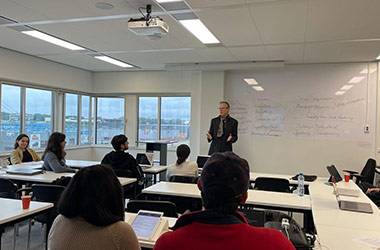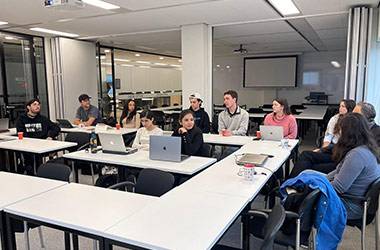Wittenborg Online News!
Intercollegiate Debate on Child Labour in West African Cocoa Industry
Intercollegiate Debate on Child Labour in West African Cocoa Industry
Intercollegiate Debate on Child Labour in West African Cocoa Industry
https://www.wittenborg.eu/intercollegiate-debate-child-labour-west-african-cocoa-industry.htm
Debate Touches on Problems, Opportunities & Ethical Dilemmas
On 29 September, Wittenborg students from the EBA (Entrepreneurial Business Administration) and MBA (Master of Business Administration) programmes participated in an intercollegiate debate with American students from the Institute for the International Education of Students Study Abroad programme in Amsterdam. The central topic was child labour in the West African cocoa industry, but the debate also touched on sustainability, transparency in the supply chain and corporate social responsibility.
The participating students formed teams representing the different stakeholder positions (business enterprise, farmer, NGO and consumer) to discuss the problems, opportunities and ethical dilemmas. The students reconvened for a rousing debate in which each team described its community’s role in addressing the problems of child labour in the supply chain and its vision for the future. Wittenborg lecturer Amy Abdou organised the event on behalf of Wittenborg and moderated the debate. Students from both programmes were supplied with background articles and documentaries in preparation for the debate.

The Dutch company Tony’s Chocoloney was used as a case study and it also served as a good example for the team representing the social enterprises. The team argued that SMEs are poised to set up external monitoring infrastructures and partner with corporations to help them directly tackle the worst forms of child labour. They also called for collaborations with NGOs and private foundations to establish health clinics so that children who are currently working on the plantations have access to emergency medical care.
The team representing Mars Inc. had to defend a difficult position, but Wittenborg students were well prepared, having studied the case in the courses Family Business and Management Leadership and the Organisation. Mars is one of the only privately owned companies at the heart of the discussion around the eradication of child labour because they signed the Harkin Engel Protocol in 2001 and were recently named in a lawsuit in the U.S. involving eight formerly enslaved child labourers. The Mars team, assisted by Wittenborg lecturer Andreas Ooijer, argued that Mars is not able to trace their supply directly to the farmers, which makes the problem difficult to address. Mars deals with contractors in the countries where cocoa is grown, and the price is set by the Ivorian and Ghanaian governments. They also acknowledge that they must do more to combat forced child labour and deforestation and have started working with farmers in these countries to help make their agricultural practices more sustainable.

The NGOs argued that their role in addressing child labour is to educate the farmers and help them forge partnerships with more powerful allies while using social media to inform the public. They introduced the idea of an app that would allow consumers to search for ethically sourced brands. The consumers argued that they must be made more aware of how their demand for cheap products drives certain inhumane labour practices, as seen in the fast fashion and smart phone industries. The consumers also argued for foreign direct investment to help local cocoa cooperatives transition to having their own refineries and production plants. As a large percentage of citizens in both the Ivory Coast and Ghana work in the agriculture industry, the farmers discussed nationalising the farms and restoring respect to the position of the farmer in society.
According to the World Bank, approximately 60% of the cocoa farmers in the Ivory Coast live below the poverty line. The farmers chose to focus on subcontractors and corrupt politicians as barriers to the eradication of child labour and argued that corporations should deal with local leaders and farmers directly to enhance the chance of successfully addressing the problem. Partnerships and foreign direct investment in infrastructure will allow for more sustainable and efficient practices for both parties. Wittenborg is committed to addressing the UN's Sustainable Development Goals.
The debate was not just about addressing systemic problems in the supply chain but also an opportunity to discuss the next steps in transforming an archaic industry with a colonial legacy into a sustainable and humane enterprise. The contribution of Wittenborg students from developing countries is invaluable in these types of discussions because they often have first-hand knowledge of how the extraction of raw materials can benefit corporations disproportionately. The biannual debate also provides all Wittenborg students with the chance to develop their presentation skills and network with other international students studying social entrepreneurship and leadership in the Netherlands.
WUP 4/10/2021
by Amy Abdou and Hanna Abdelwahab
©WUAS Press
771 words